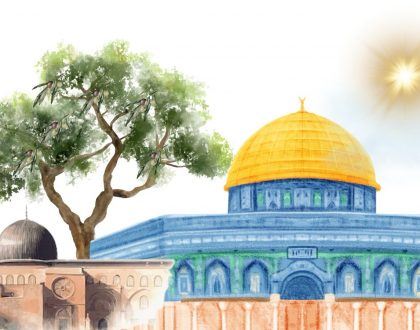The Miracle of the Quran
by Hana
The Quran is a very important part of every Muslim’s life, and Muslims believe that the Quran itself is a miracle. It was revealed in segments over 23 years, from 610 to 633 CE.
Muslims believe that while other prophets* were given a variety of miracles to perform, Muhammad* – the last prophet – was given a miracle that would last until the end of time. Originally, it existed only verbally, but was compiled into book form after many Muslims died in a battle, and the leader at the time became worried that all the people that had memorised it would die, and it would not be preserved. However, it has now survived for 1400 years, and not once been changed.
One of the amazing things about the Quran is that there are no inconsistencies in it, even though it was revealed over twenty-three years and not compiled until years after the last revelation. If it were written by man, it is likely that there would have been places that contradicted themselves or that, even if they did not exist originally, irregularities would have been created in compilation. The fact that these do not exist is a sign for Muslims that the Quran is divine revelation.
An example of this is the story of a man who wanted to test Muslims, so he wrote out a copy of the Quran in beautiful calligraphy, but put deliberate mistakes in it. He then went to a religious leader to ask for his opinion, but was told to burn it because of its errors.
In this way, the Quran has been kept exactly as it is for centuries, enabling us to be certain that the Quran we read now is identical to the one that was revealed to the Prophet Muhammad* 1400 years ago, to the letter; so we are reading the very same words that God sent down, which have not been altered in any way.
Similarly, Muslims believe that the Quran will endure until the end of time, because, inverse of the reason it was written down, even if all copies are destroyed there are many people who have memorised it. It is called the ‘eternal miracle’ because, unlike traditional miracles which are witnessed only by the people of the time, it can be appreciated by anyone from any era, and the deeper people study it the more amazed they are by its depth, beauty and eloquence.
Further, the Arabic language is amazingly rich – for one word in English there can be multiple in Arabic – for example ‘love’ has seventy-seven translations, all referring to different types of love – which makes the Quran incredibly precise.
An interesting example of this is when God talks about the embryo in its early stages. With one word – alaqa (عَلَقَةَ) – He refers to the embryo as a leech, a ‘suspended thing’, and a clot, and on closer inspection all three of those meanings accurately describe it.
First the leech: the embryo is totally dependent on its mother, as a leech is dependent on its host.
Then a clot: before it has started to take shape, the embryo is simply a group of cells in a small lump, and as blood does not start to circulate until the third week it is literally a clot.
Finally, the embryo is described as a ‘suspended thing’.
The fact that the Quran should have mentioned this in the first century is amazing because there is no way that the people of the time could have known about it. This is just one of the many reasons why Muslims believe that the Quran is divine revelation.
Thus, many Muslims learn Arabic so that they can understand the Quran in its original form, rather than translating it to English, a conversion which would state only one of these meanings, resulting in the loss of much of the richness of the Quran.
Another reason why Muslims learn to at least read, if not understand, Arabic is that the language is such that a tiny mistake in pronunciation, such as just stretching a vowel sound for too long, can change the meaning of the entire passage. For this reason the Arabs of the time recorded precisely how each letter sounded and which part of the mouth or throat it came from, allowing people in modern times from all over the world to recite Arabic sometimes even better than native speakers, and protecting the Quran from being affected by things such as the English vowel shift in the Middle Ages that made words sound different than they are spelled, ensuring once again that the modern Quran is exactly the same as its original.
The linguistics of the Quran also contribute to its being thought of as a miracle. The use of language is unlike anything that has ever been written before or since. It has been analysed time and again, but not even the best experts have been able to improve or find fault with it.
The Quran presents a challenge that, although originally put to the polytheistic Arabs of the time, still stands to humanity in general. In multiple places it states that if people believe that the entire Quran was simply made up by the Prophet* then they too should be able to produce something like it.
The Quraysh – the Arabs of the time – prided themselves on their beautiful poetry and even used to hold competitions in an attempt to outdo each other. At first, the challenge was to create an entire book of the same standard as the Quran, but as these famed poets were increasingly unable to produce anything of the required calibre, the challenge was lowered and lowered until finally it reached the point at which it still stands – it says in Surah Baqarah ‘And if you all are in doubt about what I have revealed to My servant, bring a single chapter like it.’ [2:23] When you consider that the shortest chapters of the Quran are just three verses long, this doesn’t seem like a difficult task, and yet in 1400 years not one single line has been produced to match the quality of the Quran.
One of the attempts made by a man who tried to claim that he himself was a prophet went something like this:
The Elephant –
What is the elephant?
And what would have you know what the elephant is?
It has a scraggly tail and a very long trunk.
By contrast, the Quran presents depth of meaning in an articulate and rhythmic way.
Another fact that is evidence for the Quran not being written by humans is the Prophet* himself. Orphaned at the age of six, the Prophet* was looked after by his grandfather, who himself died two years later. The eight-year-old Muhammad* was then brought up by his uncle and educated in bargaining and negotiation, so that by the age of forty he was an expert tradesman, but completely illiterate in every way. This made it all the more unthinkable that he should produce even one verse to equal – or, dare it be said – surpass the best poets of the time.
The rhythm and rhyme schemes of the chapters is also significant. We will now play you a clip of Surah Naba, a prime example of this. Look out for where the rhyme scheme changes.
[play/read Surah Naba, verses 1-15?]
Hopefully you heard where the tone changes, and this actually correlates to a shift in the subject matter, where God stops talking about the Day of Judgement and moves on to His signs that are visible in His creation.
The sound of the verses, coupled with their meaning, was so compelling for the Quraysh that it significantly swung the opinions of a few key people. One such person was Umar ibn Al-Khattab**, one of early Islam’s fiercest opponents, who was in fact on his way to assassinate the Prophet* when stopped in the street. It was revealed to him that his own sister and her husband had recently converted, and pointed out that he should attend to his own relatives first, which enraged him so much that he was diverted from his original purpose and went instead to his brother-in-law’s home.
His sister and her husband had just been receiving their Quran lesson, and hastily hid the scrap of verse they had been learning from when they heard him arriving. However, he had overheard them reciting and hit his sister in his fury. The sight of her hurt calmed him, and he asked to see what they had been reading. She refused, telling him to wash first, before reading him what we now call Surah Ta-Ha. Upon hearing the words, Umar** fell down in prostration and converted immediately, demonstrating the amazing power of the Quran.
Umar**, well-known for his outspokenness and warlike tendencies, went on to become a staunch advocate of Islam, helping greatly to spread it around the Quraysh. He eventually became the second caliph of Islam.
Another example of someone affected by the strength of the Quran is Tufail bin ‘Amar Dosi, a Yemeni chief and poet who often visited Makkah for trade. At the time, the Prophet* had only just begun to openly spread Islam, and the Quraysh were so scared of the undeniable pull of the Quran’s message of equality that they warned visitors to plug their ears in case they converted from hearing it.
On one of his trips, Tufail too was warned: “Beware of the person called Muhammad. Do not listen to him, otherwise you will fall a prey to him. His discourse is so charming that anyone who listens to him follows him blindly. He has played havoc in our city and has ruined our peace and tranquility.”
Following the advice, Tufail put cotton wool in his ears and stayed away from the Muslims, but one day he happened to be passing by the Kaba and saw the Prophet* praying. He heard the verses being recited and, intrigued by these words that had caused the Quraysh such panic, stopped to listen.
He said to himself: “What a fool I am! I am myself a good poet and can judge very well the standard and quality of a piece of literature, why shouldn’t I listen and talk to him. If it is worth appreciation I must acknowledge it with open heart; if it is something worthless then I will certainly not fall a prey to him.”
He stopped near the Prophet* and listened attentively to the recitation. Later, he followed him home and explained how he had been warned to plug his ears but that he wanted to hear more. When he was told about Islam and its teachings, he was struck with awe. He exclaimed, “By Allah! My ears never heard any verses better than this before; nor my eyes have ever seen a religion more attractive than Islam. I accept with all my heart the teachings and commandments of the true religion of Allah.” He returned to Yemen and preached, spreading Islam to a great number of people.
The Quran is a source of comfort to Muslims, as well as a manual on how they should live their lives. It has a massive spread of content – from answers to fundamental questions about our existence – what we are doing on Earth, what happens after death – to instructions on how we should live our lives. It provides precise instructions the distribution of wealth and how to sustain a strong community.
It also includes stories, which provide evidence of its being from God. For example, it is full of stories about previous prophets*, with a level of detail that Muhammad PBUH could not possibly have known but much of which is backed up by the Torah and Bible.
There are also predictions of future events. Some of these are still to come, but others have actually happened since the final revelation. One example is the defeat of the Persians by the Christian Romans – a result that would have been considered unthinkable when the Quran was revealed, as the Roman Empire was on the point of collapse. However, four years after the death of the Prophet*, the Emperor Heraclius was in fact victorious over the Persians in the Battle of Nineveh.
As it says in Surah Baqarah, the second chapter of the Quran: ‘That is the book in which there is no doubt, guidance for those who believe.’ [2:2]
*peace be upon him
**may God be pleased with him
Written by Hana Khan in 2014
Recommended Posts

Masjid al Aqsa – why it has a very special place in our hearts
November 29, 2023

Palestine: The Holy Land
November 23, 2023

